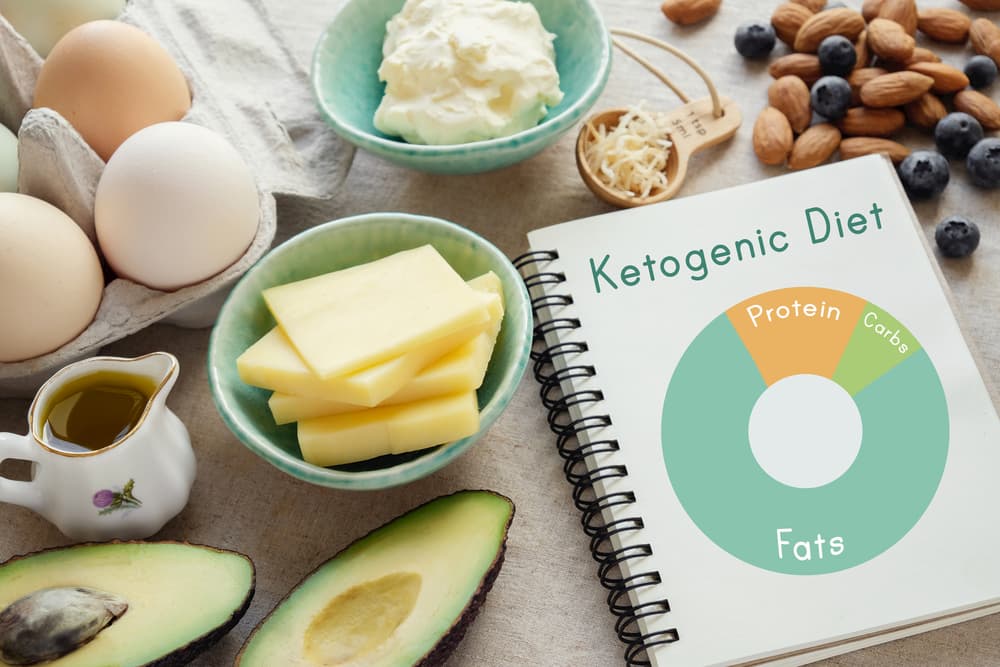You may have heard the buzz about the almost zero-carb, high-fat ketogenic diet.
Depending on whom you talk to, it’s either a revolutionary way to curb appetite, improve both your brain’s ability to focus as well as your body’s ability to burn fat reserves, and enhance performance – or a total scam. So, what’s the verdict? What does the science say? Like many debates in nutrition, the answer isn’t simple. Depending on specific factors, a keto diet could either be beneficial for you or completely unsuitable.
What is a Ketogenic Diet?
The ketogenic or keto diet involves drastically reducing your carbohydrate intake and replacing it with fat. This reduction in carbs puts your body into a metabolic state called ketosis. When this happens, your body becomes incredibly efficient at burning fat for energy. It also turns fat into ketones in the liver, which supplies energy for your brain.
What are Ketones?
Your body produces ketones when you don’t have enough sugar derived from carbohydrates in your diet, or not enough glucose in your body to convert into energy. You need another source, so your body uses fat instead. Your liver turns this fat into ketones, a type of acid, and sends them into the bloodstream. Your muscles, brain and other tissues can then use them as fuel.
Different Types of Ketogenic Diet
There are a few different versions of the ketogenic diet, including:
- Standard ketogenic diet – A very low-carb, moderate-protein and high-fat diet. It typically contains 75% fat, 20% protein and 5% carbs.
- High-protein ketogenic diet – Similar to a standard ketogenic diet but incorporates more protein. The ratio is often 60% fat, 35% protein and 5% carbs.
- Cyclical ketogenic diet – This diet involves periods of higher-carb refeeds, such as 5 ketogenic days followed by 2 high-carb days.
- Targeted ketogenic diet – This diet allows you to add carbs around workouts.
Only standard and high-protein ketogenic diets have been studied extensively. Cyclical and targeted ketogenic diets are generally more advanced approaches used by athletes or bodybuilders.
Benefits of the Ketogenic Diet
Switching to a keto diet can offer a few benefits including:
- Weight loss – In a normal diet, your body burns carbohydrates for energy. By burning fat for energy instead, you can lose body fat more quickly. Consuming foods that are high in fat can also eliminate cravings and feelings of hunger.
- May prevent some diseases – Some studies have indicated that a keto diet may have benefits against cancer, epilepsy, diabetes and Alzheimer’s disease.
- Possibly better suited to a sedentary lifestyle – If you spend most of your time sitting at a desk without participating in regular, intensive exercise, you may not need as many carbs and could function on a keto diet while preventing weight gain.
Many proponents of the keto diet also report increased focus and energy throughout the day. This may be because eliminating carbs can help control and stabilise blood sugar levels.
Downsides of Keto Diet
The keto diet is highly restrictive, meaning your food choices are much more limited. This makes sticking to it difficult for a lot of people dieting for their health. For example, you can’t have:
- Most dairy (except high-fat ones like butter and certain cheeses)
- Fruit
- Grains
- Beans and legumes
- Starchy vegetables (such as potatoes)
- Most processed foods
- Alcohol
- Sugary foods
- Many condiments and sauces
- Slightly sweet vegetables such as winter squash, beets, or carrots
Fewer carbs also isn’t necessarily a good thing. Some people, especially athletes, need to consume a lot of carbs to keep their bodies in shape for their exercise routines. A keto diet could result in less energy and endurance in athletes.
Ketogenic Diet Side Effects
You may also have to deal with some other keto diet side effects, including bad breath from high levels of acetone in your blood and digestive issues like constipation and diarrhoea. Many people find the transition process to a keto diet to be unpleasant. Your body takes time to adapt to burning fat for fuel instead of carbs. People often report brain fog, tiredness and feeling sick when starting a keto diet. This is termed the keto flu.
The keto diet can be a great way to lose weight and though some people flourish on it, others find it unpleasant. If you’re curious about what a ketogenic diet could do for your body, it may be worthwhile to consult with a healthcare professional.
Find out Whether the Keto Diet is Right for You in Melbourne
Pinnacle Health Group provides a range of services including nutritional therapy, massage, clinical Pilates, yoga and more in multiple locations in central Melbourne. If you’re injured or need health advice, book an appointment from one of our centrally based health clinics or join a wellness class near you.

